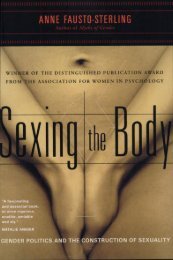C. Wiebes - Intelligence en de oorlog in Bosnië 1992-1995. De rol van de inlichtingen- en veiligheidsdiensten - Engels
C. Wiebes - Intelligence en de oorlog in Bosnië 1992-1995. De rol van de inlichtingen- en veiligheidsdiensten - Engels
C. Wiebes - Intelligence en de oorlog in Bosnië 1992-1995. De rol van de inlichtingen- en veiligheidsdiensten - Engels
- No tags were found...
You also want an ePaper? Increase the reach of your titles
YUMPU automatically turns print PDFs into web optimized ePapers that Google loves.
77For <strong>in</strong>stance, the g<strong>en</strong>eral m<strong>en</strong>tal attitu<strong>de</strong> <strong>in</strong> the area of <strong>in</strong>tellig<strong>en</strong>ce was still too much ori<strong>en</strong>tedtowards the old East-West way of th<strong>in</strong>k<strong>in</strong>g. Many analysts found it hard to abandon this habitualpattern. There was still too much th<strong>in</strong>k<strong>in</strong>g, reason<strong>in</strong>g and analysis <strong>in</strong> the context of the Cold War andthe transition took place only with difficulty. Furthermore, the <strong>in</strong>tellig<strong>en</strong>ce services were nowconfronted with a differ<strong>en</strong>t sort of conflict, a low <strong>in</strong>t<strong>en</strong>sity conflict, which was new to them. Manyservices found this difficult to cope with, because there was oft<strong>en</strong> no well-<strong>de</strong>f<strong>in</strong>ed concept that ma<strong>de</strong>clear who exactly the <strong>en</strong>emy was.The operations of differ<strong>en</strong>t paramilitary organizations <strong>in</strong>creased this confusion further.Alliances of warr<strong>in</strong>g factions could shift with<strong>in</strong> 24 hours, and allies <strong>in</strong> a giv<strong>en</strong> region or town couldsudd<strong>en</strong>ly turn out to be <strong>en</strong>emies <strong>in</strong> a differ<strong>en</strong>t district or town. After all, a conflict with ethnic andreligious backgrounds is quite a differ<strong>en</strong>t matter to a few Soviet tank divisions on the North Germanpla<strong>in</strong>s.The Western <strong>in</strong>tellig<strong>en</strong>ce community had suffici<strong>en</strong>t resources to gather timely warn<strong>in</strong>gs aboutpreparations for war. But, as the British author Rathmell put it so aptly: ‘These warn<strong>in</strong>g systems are notappropriate for warn<strong>in</strong>g of threats such as ethnic conflicts. Such threats require more holisticassessm<strong>en</strong>t but <strong>de</strong>f<strong>en</strong>ce <strong>in</strong>tellig<strong>en</strong>ce ag<strong>en</strong>cies do not yet appear to have adapted their approaches.’ 367As far as political problems were concerned, this chapter has argued that <strong>in</strong>tellig<strong>en</strong>ce servicesoft<strong>en</strong> had a differ<strong>en</strong>t view of the conflict <strong>in</strong> Bosnia from policymakers. In some Western <strong>in</strong>tellig<strong>en</strong>ceand security services the th<strong>in</strong>k<strong>in</strong>g was not <strong>in</strong> terms of ‘good guys, bad guys’, and usually a morebalanced view could be <strong>de</strong>tected than that adhered to by the politicians. Former CIA director JamesWoolsey confirmed that the CIA was balanced compared both with those who said there were noMuslims atrocities and those who said the Bosnian Muslims killed as many as the Serbs. Both viewswere wrong. The same issue was also raised <strong>in</strong> the many confid<strong>en</strong>tial <strong>in</strong>terviews and <strong>in</strong> thecompreh<strong>en</strong>sive analysis of the Canadian <strong>in</strong>tellig<strong>en</strong>ce community that has be<strong>en</strong> quoted ext<strong>en</strong>sivelyabove.However, as the conflict progressed, and the press, public op<strong>in</strong>ion and the politicians<strong>in</strong>creas<strong>in</strong>gly took the si<strong>de</strong> of the Bosnians, some <strong>in</strong>tellig<strong>en</strong>ce services ‘turned’. This was especially trueof the Americans. The ph<strong>en</strong>om<strong>en</strong>on of the politicization of <strong>in</strong>tellig<strong>en</strong>ce emphatically raised its head. 368Studies were sometimes writt<strong>en</strong> to please the most s<strong>en</strong>ior policymakers, as opposed to provid<strong>in</strong>g themwith <strong>in</strong>tellig<strong>en</strong>ce. This had already be<strong>en</strong> the case dur<strong>in</strong>g the Cold War, and it was sometimes nodiffer<strong>en</strong>t <strong>in</strong> Bosnia. Unwelcome issues with respect to the activities of the Bosnian Muslims and Croatswere only reported to a limited ext<strong>en</strong>t, if at all. Political correctness also crept <strong>in</strong>to the analyses, whichwas evid<strong>en</strong>t from the fact that the <strong>de</strong>eds of the Bosnian Serbs came fully <strong>in</strong>to the spotlight while themis<strong>de</strong>eds of the Muslims and Croats were giv<strong>en</strong> hardly any att<strong>en</strong>tion.As an example, there is the trouble that the spokesman of the State <strong>De</strong>partm<strong>en</strong>t had <strong>in</strong>recogniz<strong>in</strong>g that the Bosnian Muslims had conc<strong>en</strong>tration camps. Accord<strong>in</strong>g to him, they were merely<strong>de</strong>t<strong>en</strong>tion c<strong>en</strong>tres.369Furthermore, the report<strong>in</strong>g of the armed conflict betwe<strong>en</strong> the differ<strong>en</strong>t factionswas not always uniformly ‘policy neutral’. Cause and effect, as well as action and response, were oft<strong>en</strong>pres<strong>en</strong>ted out of sequ<strong>en</strong>ce, either by policymakers, or the press. In this respect, the politicalpolicymakers were oft<strong>en</strong> supported by a press which expressed very little criticism and which, withrespect to television report<strong>in</strong>g, was ma<strong>in</strong>ly <strong>de</strong>p<strong>en</strong>d<strong>en</strong>t on the large television networks.The views of some Western services <strong>in</strong>creas<strong>in</strong>gly diverged and no longer correspon<strong>de</strong>d witheach other. This had the consequ<strong>en</strong>ce that transatlantic collaboration <strong>in</strong> the area of <strong>in</strong>tellig<strong>en</strong>ce liaisonalso started to suffer. As outl<strong>in</strong>ed compreh<strong>en</strong>sively above, <strong>in</strong>tellig<strong>en</strong>ce liaison was already a <strong>de</strong>licatesubject. The exchange of <strong>in</strong>tellig<strong>en</strong>ce is not automatic, as is sometimes assumed. It usually happ<strong>en</strong>s onthe basis of bilateral agreem<strong>en</strong>ts and accord<strong>in</strong>g to the quid pro quo pr<strong>in</strong>ciple. If a service has noth<strong>in</strong>g to367 Andrew Rathmell, ‘Privatis<strong>in</strong>g <strong>in</strong>tellig<strong>en</strong>ce’, Cambridge Review of International Affairs, Vol. XI (1998) 2, p. 203.368 This had also frequ<strong>en</strong>tly tak<strong>en</strong> place <strong>in</strong> earlier years. See: Bill Gertz, ‘study reveals "politicization" of <strong>in</strong>tellig<strong>en</strong>ce’, TheWash<strong>in</strong>gton Times, 09/10/00.369 Sremic, War of Words, p. 115.





